An exhaust manifold leak in an internal combustion engine is serious. It can let toxic fumes into your vehicle. This is why you need to fix it fast to avoid harming important parts like the catalytic converter.
Signs of a leak include a ticking sound, an exhaust smell from the engine, and black soot around the downpipe and manifold.
Key Takeaways
- Exhaust manifold leaks can cause various issues, including slower warm-up times, malfunctioning sensors, and premature catalytic converter failure.
- Common causes of exhaust manifold leaks are leaking gaskets, cracked manifolds, and loose or broken bolts and studs.
- Repairing an exhaust manifold leak requires specific tools and steps, including replacing the manifold gasket.
- Ignoring an exhaust manifold leak can lead to environmental concerns, engine performance problems, and long-term damage.
- Regular maintenance and proactive inspection can help prevent exhaust manifold leaks and other issues.
Understanding the Exhaust Manifold and Its Function
The exhaust manifold is key in a car’s engine system. It collects and directs toxic gases from the combustion process. This part keeps harmful fumes out of the cabin, making driving safer and more efficient.
What is an Exhaust Manifold?
An exhaust manifold is a metal part that connects the engine’s cylinders to the exhaust system. It gathers gases from multiple cylinders and sends them to a single outlet. This outlet then leads to the catalytic converter and the exhaust system.
How Does the Exhaust Manifold Work?
The exhaust manifold’s main job is to move exhaust gases away from the engine. As pistons move, they push gases into the manifold. The manifold then directs these gases into a single pipe, which goes to the catalytic converter and the exhaust system.
Common Materials Used in Exhaust Manifolds
- Cast iron: A durable and affordable choice, cast iron manifolds can withstand the high temperatures and pressures of the exhaust system.
- Stainless steel: Offering superior corrosion resistance and longevity, stainless steel manifolds are a more premium option, often found in high-performance or luxury vehicles.
- Aluminum: Lighter in weight than cast iron or stainless steel, aluminum manifolds are sometimes used in modern vehicles to reduce overall weight and improve fuel efficiency.
Regardless of the material, a well-designed and properly functioning exhaust manifold is crucial for maintaining engine performance, fuel efficiency, and environmental compliance.
Causes of Oil Leaking from the Exhaust Manifold
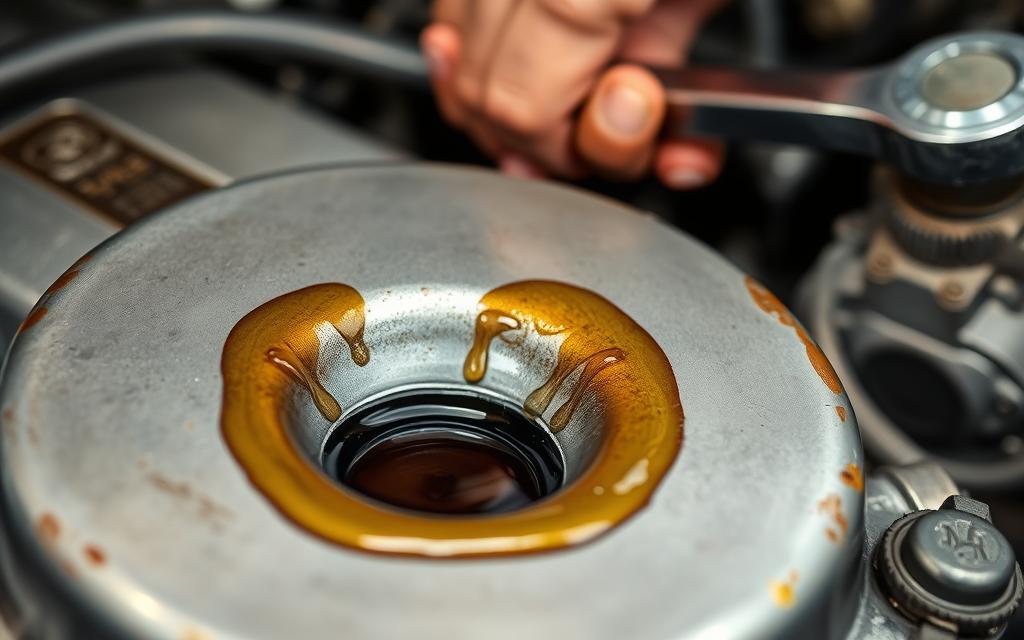
Oil leaks from the exhaust manifold can be a big problem for car owners. There are many reasons why this happens. Knowing the main causes is key to fixing the issue.
Faulty Valve Cover Gasket
A bad valve cover gasket is a common cause of oil leaks. This gasket keeps the valve cover sealed. If it gets damaged, oil can leak out and onto the exhaust manifold.
Worn Engine Seals
Engine seals and gaskets can wear out over time. This lets oil escape into the exhaust system. Leaks can then appear on the manifold.
Overfilled Engine Oil
Too much engine oil can also cause leaks. High oil levels put extra stress on seals and gaskets. This stress can cause them to fail, leading to oil leaks in the exhaust system.
Knowing why oil leaks happen is the first step to fixing it. Whether it’s a bad valve cover gasket, worn seals, or too much oil, you can stop the leak. This helps protect your engine and exhaust system.
“Properly maintaining your engine’s seals and gaskets is crucial for preventing oil leaks and ensuring the overall health of your vehicle.”
Signs of Oil Leakage from the Exhaust Manifold
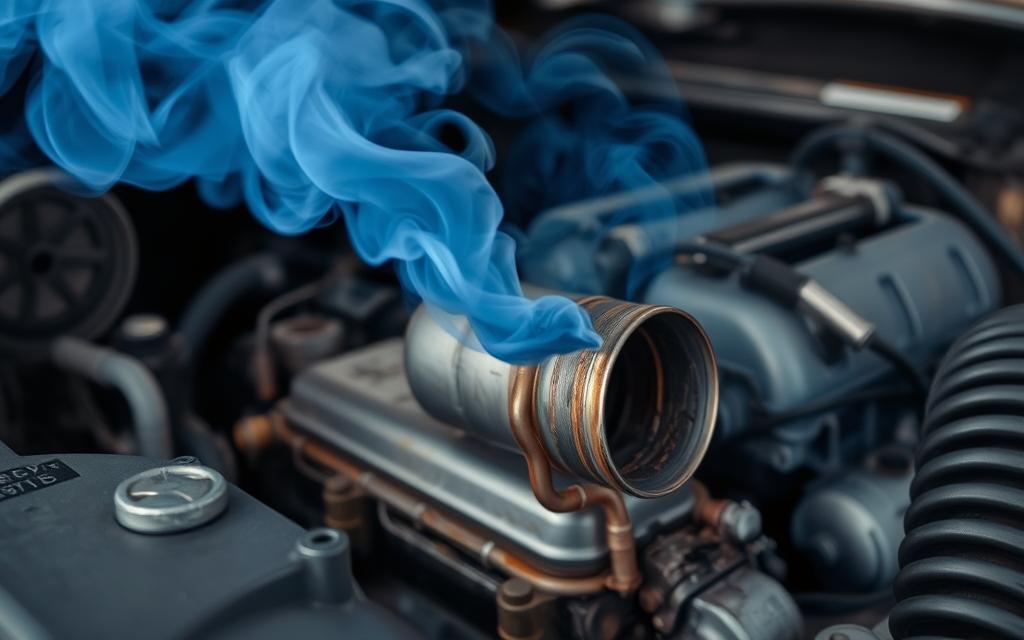
Spotting an oil leak from the exhaust manifold is key to fixing it fast. Look out for visual signs and changes in how your engine runs. Knowing these signs early can stop bigger problems later.
Visual Inspection Indicators
Oil residue or black soot around the exhaust manifold is a clear sign of a leak. You can see this during a regular engine bay check. Also, blue smoke from the exhaust means oil is getting into the exhaust system.
Changes in Engine Performance
An oil leak can really affect your car’s engine. You might notice slower acceleration, worse fuel economy, and louder engine sounds. These signs show there’s a problem with the exhaust manifold.
Unusual Smells or Smoke
An oil burning smell from the engine bay is another common leak sign. This smell happens when oil burns off in the hot exhaust system. You might also see a haze or smoke around your car, showing an oil leak.
Knowing these visual, performance, and smell clues helps you spot an oil leak fast. This way, you can fix it before it gets worse.
Diagnosing Oil Leaking Issues
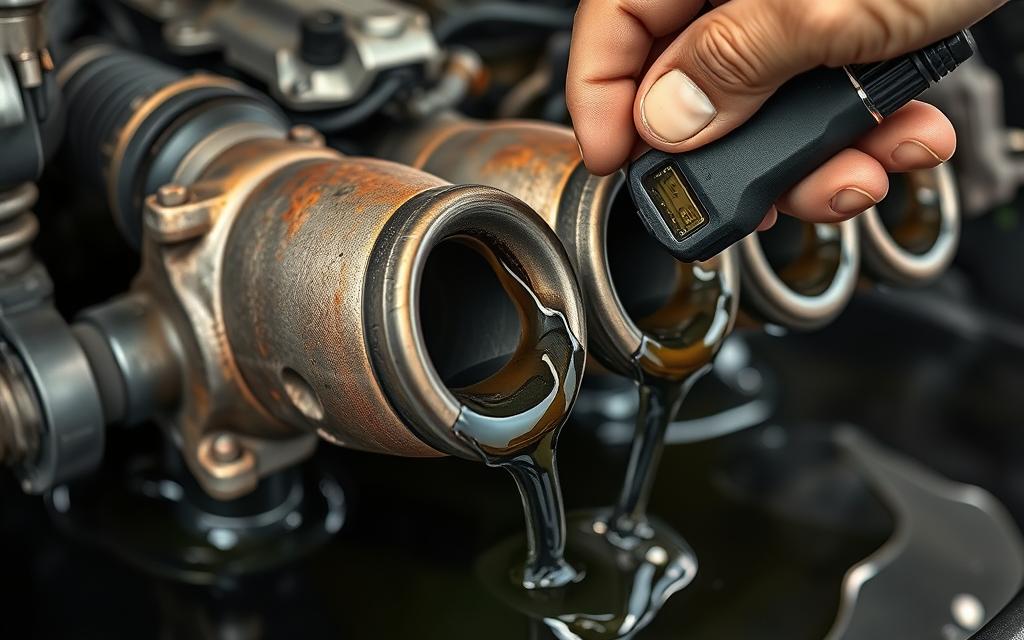
Figuring out where an oil leak comes from in the exhaust manifold needs a careful plan. By doing a detailed visual check and using the right tools, you can usually find the problem on your own. This way, you might not need to call a professional.
Visual Inspection Techniques
Start by looking closely at the engine and exhaust manifold. Check for oil marks or drips on the manifold and nearby. Use a flashlight and mirror to see into tight spots. Oil stains or drips can tell you a lot about the leak’s location and type.
Tools Required for Diagnosis
- Flashlight: To light up dark spots and find the leak’s source.
- Mirror: Useful for checking tight engine spaces.
- Degreaser: Helps clean the manifold and areas around it, making leaks easier to spot.
- Rags: For cleaning off extra oil and dirt to see better.
When to Consult a Professional
If you can’t find where the exhaust leak repair or manifold leak symptoms are coming from, or if you think there are many leaks, get a mechanic’s help. They have the skills and tools to find the problem and fix it. Also, if the leak is big or if your engine isn’t running right, a pro should check your car.
| Common Causes of Oil Leaks from Exhaust Manifold | Symptoms | Repair Costs |
|---|---|---|
| Faulty valve cover gasket | Oil residue, bluish smoke, reduced engine performance | $200 – $600 |
| Worn engine seals | Oil dripping, bluish smoke, engine overheating | $500 – $1,000 |
| Overfilled engine oil | Oil residue, smoke, reduced fuel efficiency | $50 – $100 |
“Troubleshooting oil leaking from exhaust pipes can often be done at home without the need for professional examination.”
Impact of Oil Leaking from the Exhaust Manifold
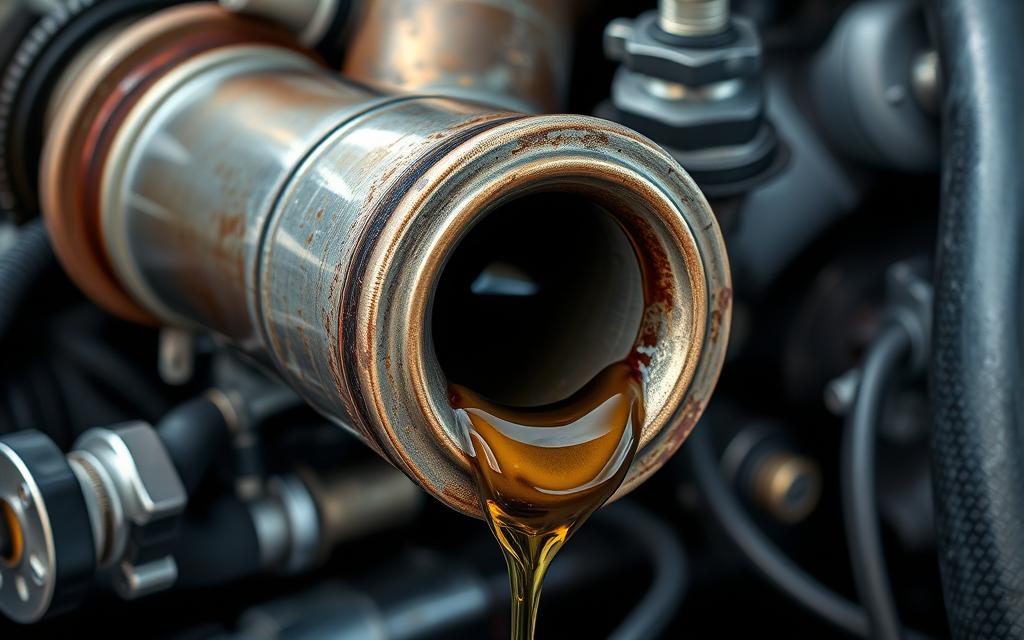
Oil leaks from the exhaust manifold can harm the environment and your car’s performance. It’s important to understand these effects to fix the problem quickly and keep your car running well.
Environmental Concerns
Oil leaks into the exhaust system can increase emissions and pollution. The oil burns in the exhaust, releasing harmful gases. These gases can worsen air quality and contribute to smog.
Engine Performance and Efficiency
Oil leaks can slow down your car’s engine and make it less fuel-efficient. They can cause the engine to warm up slower and affect how it burns fuel. This can make your car run less smoothly.
Long-term Damage Risks
Ignoring oil leaks can damage your car’s engine over time. Oil in the exhaust can harm the catalytic converter, leading to expensive repairs. It can also damage other engine parts, like the turbocharger, shortening your car’s life.
| Impact | Potential Consequences |
|---|---|
| Environmental Concerns | Increased emissions, air pollution, and smog formation |
| Engine Performance and Efficiency | Slowed warm-up, improper fuel trim, disrupted EGR valve function, and reduced fuel efficiency |
| Long-term Damage Risks | Catalytic converter failure, turbocharger issues, and compromised engine longevity |
Fixing oil consumption issues and exhaust leak repair quickly is key. Early action can prevent costly and dangerous problems. Regular maintenance and quick fixes are essential for your car’s health.
Quick Fixes for Oil Leaking from Exhaust Manifold
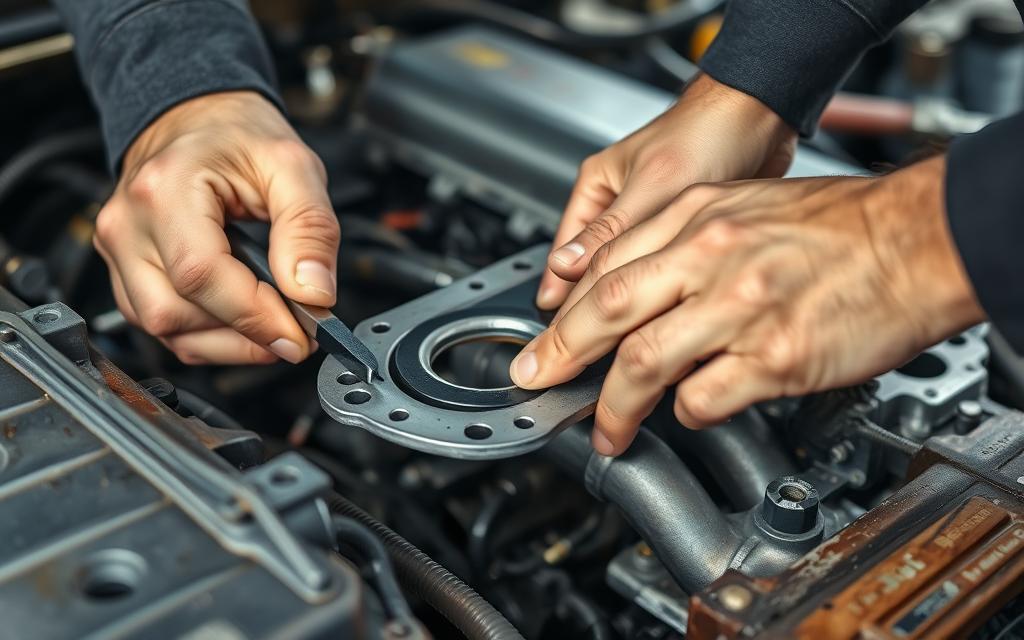
Acting fast is key when you see oil leaking from the exhaust manifold. Quick fixes can help, but they’re not a lasting solution. Often, you’ll need to replace the manifold gasket or the whole manifold to fix it right.
Temporary Sealing Solutions
For small leaks, high-temperature sealants can work well. They’re made to handle the exhaust system’s heat. But remember, they’re just a temporary fix. You’ll need a proper exhaust leak repair or manifold gasket replacement soon.
Fluid Additives to Consider
Some people use fluid additives to stop oil leaks. These products fill gaps and crevices. But, they’re not a long-term fix. They might just hide the problem, leading to more issues if not fixed properly.
Importance of Clean-Up
Cleaning up oil or residue around the manifold is crucial. It prevents damage to your engine and exhaust system. It also helps you see how bad the leak is, making repairs easier.
While quick fixes can offer some relief, they’re not a permanent solution. Fixing the leak’s root cause is vital for your vehicle’s exhaust system’s health and performance.
When to Seek Professional Help
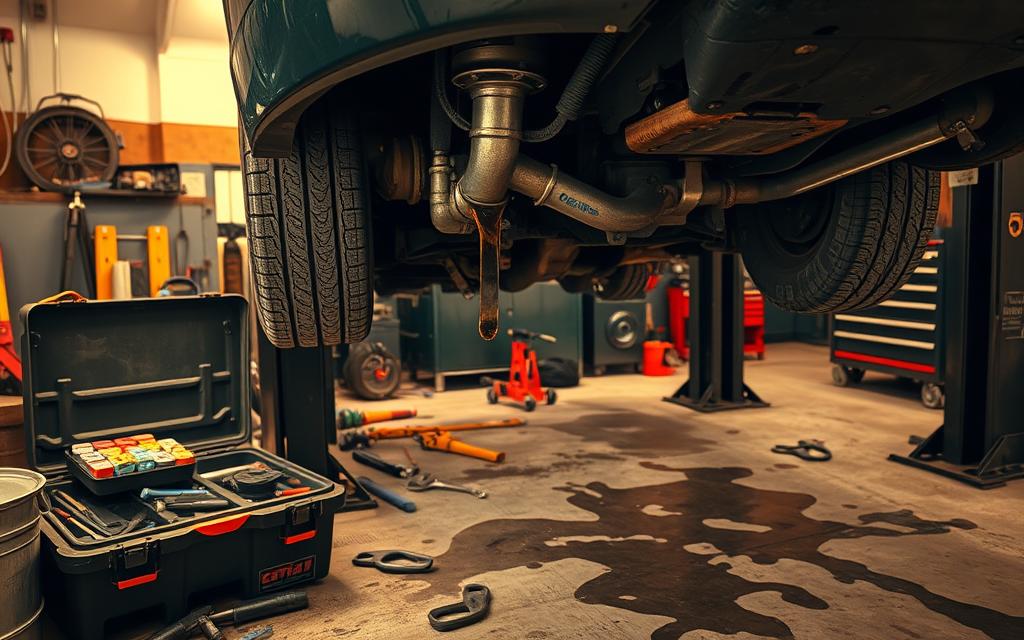
Minor oil leaks from the exhaust manifold might be fixed with DIY methods. But, knowing when to call a pro is key. If leaks keep coming back, you have many leak spots, or DIY fixes don’t work, it’s time to see a mechanic.
Signs You Can’t Ignore
Constant exhaust noise, cracks in the manifold, or big drops in fuel efficiency and power are red flags. These signs mean you need a mechanic right away. Ignoring them can cause more harm and be unsafe.
Choosing the Right Mechanic
Finding a mechanic for exhaust leak fixes or gasket replacements is important. Look for someone who knows exhaust systems well. They should have a good success rate. This ensures your car gets the right fix.
Cost Considerations for Repairs
Repair costs vary, from $300 to $1,700 or more. This depends on the problem’s size and where it is. Even though it costs more, getting a pro is worth it. It keeps your car safe and running well.
Fixing oil leaks from the exhaust manifold quickly is vital for your car’s health. If you see any warning signs, book a mechanic visit without delay.
“Ignoring exhaust leaks can lead to serious consequences, both for your vehicle and your own well-being. It’s always better to address the issue head-on with the help of a qualified professional.”
Preventative Measures for Future Issues
Keeping your vehicle’s engine healthy is key to avoiding oil leaks from the exhaust manifold. Regular maintenance, like oil changes and inspections, can spot and fix problems early. This saves you from expensive repairs later on.
Regular Maintenance Tips
Following the manufacturer’s maintenance schedule is crucial. Older cars might need oil changes every 3,500 miles. Newer cars can go up to 10,000 miles between changes. The exact time depends on how you drive, the conditions, and the engine’s tech.
Importance of Checking Engine Oil Levels
Checking your engine’s oil level regularly is a smart move. It helps catch oil consumption issues early. Low oil levels can mean a leak, so watch them closely. Don’t ignore a drop in oil levels, as it can harm your engine badly.
Using Quality Engine Oil
Choosing high-quality engine oil can prevent engine oil in exhaust problems. Synthetic oils, for example, offer better protection against wear. They reduce the chance of leaks from the exhaust manifold. Check your owner’s manual or talk to a mechanic to find the best oil for your car.
By taking these steps, you can keep your engine running longer and avoid expensive repairs. This is due to oil leaks from the exhaust manifold.
The Role of Gaskets and Seals
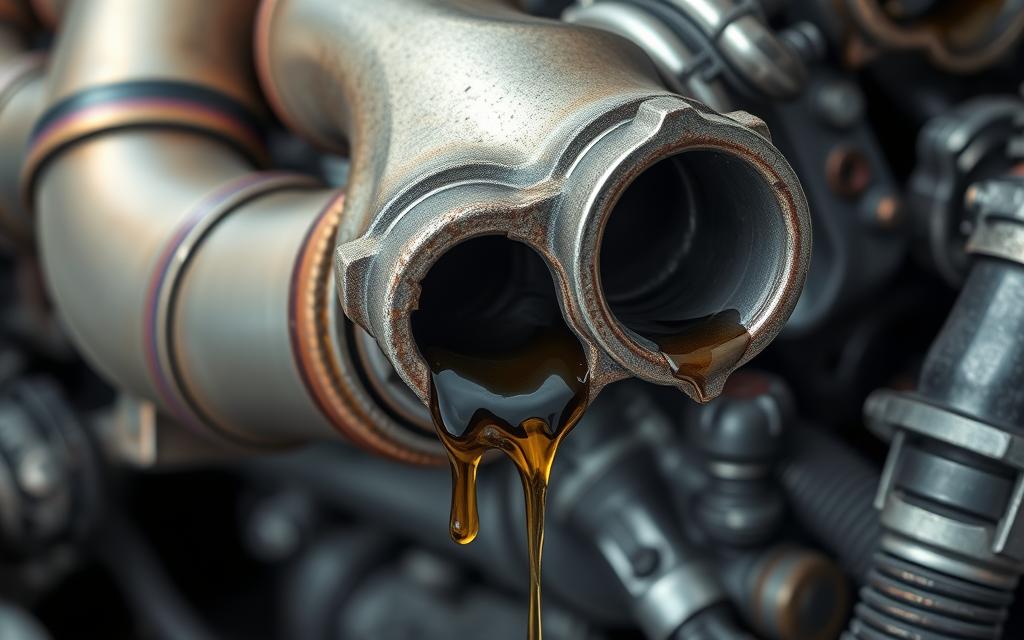
Gaskets and seals are key in stopping oil leaks from important parts like the exhaust manifold and valve cover. They keep engine oil from escaping. Knowing how they work and common problems can help fix exhaust manifold gasket leak or valve cover gasket leak issues early.
Common Gasket Problems
Gaskets wear out over time due to heat, vibrations, and aging. This makes them brittle and prone to leaks. The exhaust manifold gasket, being exposed to high heat and pressure, is often the source of oil leaks.
How to Inspect Engine Seals
It’s important to check engine seals regularly. Look for oil leaks, cracks, or wear. Do a visual check during maintenance and use a UV dye kit to find leaks.
Choosing the Right Replacement Parts
When replacing a gasket, choose high-quality, OEM-approved parts. Aftermarket gaskets might not fit or seal well, causing more leaks. Check your owner’s manual or a trusted parts supplier for the correct exhaust manifold gasket or valve cover gasket.
“Neglecting a leaking exhaust manifold gasket can cause bigger engine problems. So, fix it quickly.”
Understanding Exhaust Leaks vs. Oil Leaks
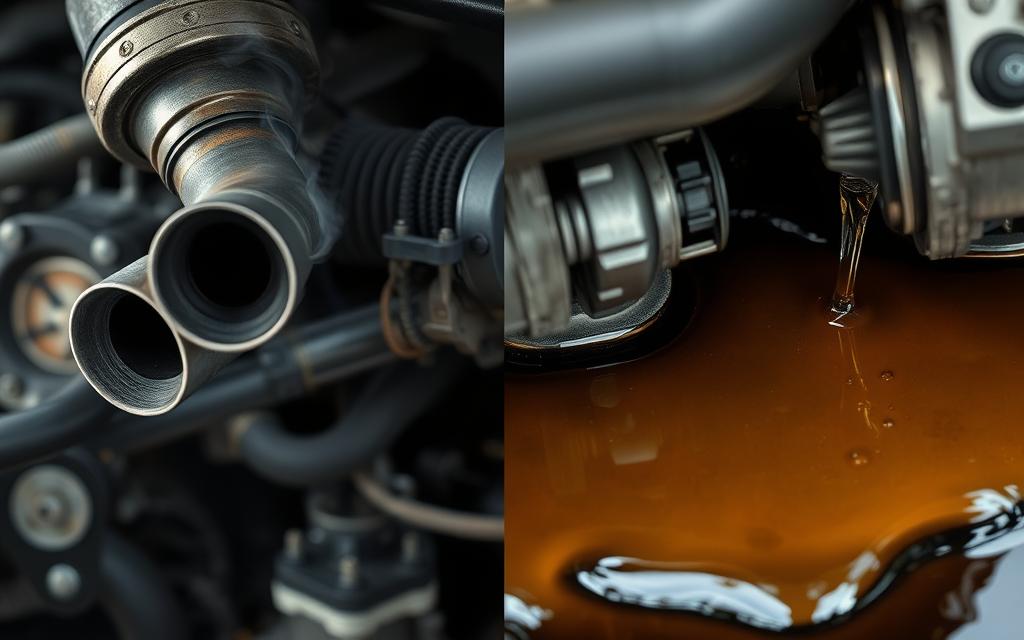
Finding where a leak comes from in your car’s exhaust or engine can be tough. Both exhaust leaks and oil leaks can look and sound similar. But knowing the differences is key to fixing the problem right.
Key Differences Between Oil and Exhaust Leaks
Exhaust leaks are all about the sound. You’ll hear a hissing or tapping noise. This is because exhaust gases are leaking out. Oil leaks, on the other hand, smell like burning and might make blue smoke. This happens when oil meets hot engine parts.
How to Identify the Source of the Leak
To find where the leak is, you need to look closely at your car’s exhaust and engine. Check the exhaust manifold, catalytic converter, and muffler for leaks. For oil leaks, look at the engine oil seals, gaskets, and other spots where oil might leak out.
| Exhaust Leak Symptoms | Oil Leak Symptoms |
|---|---|
|
|
Knowing the signs of exhaust and oil leaks helps you fix your car right. Whether it’s fixing an exhaust leak repair or dealing with an oil leaking from exhaust manifold issue, you’ll know what to do.
“Accurately identifying the source of a leak is the first step towards a successful and cost-effective repair.”
The Effect of Oil Type on Leakage

Engine oil type can affect oil leaks from the exhaust manifold. Conventional and synthetic oils have different impacts. Oil viscosity also plays a role in sealing and preventing leaks.
Conventional Oil vs. Synthetic Oil
Conventional oils are more likely to leak because of their molecular structure. Their larger molecules can seep through small gaps. Synthetic oils, with their uniform molecules, are better at sealing and resisting leaks.
How Oil Viscosity Affects Leakage
Oil viscosity, or thickness, affects its sealing ability. Thicker oils can fill and seal gaps better. But, always use the oil viscosity recommended by your vehicle’s maker to avoid other problems.
Recommendations for Oil Types
To avoid oil leaks, use the oil type and viscosity recommended by the vehicle manufacturer. This ensures the oil works well with your engine. Regular oil changes and using quality oil help keep engine seals tight, reducing leaks and oil consumption.
| Oil Type | Susceptibility to Leaks | Viscosity Impact |
|---|---|---|
| Conventional Oil | Higher | Thicker oils may seal better |
| Synthetic Oil | Lower | Viscosity still important for sealing |
“Using the right oil type and viscosity is crucial for preventing oil leaks and ensuring the long-term health of your vehicle’s engine.”
DIY Solutions for Minor Leaks
If you have a small oil leak from your car’s exhaust manifold, you can try some DIY fixes. But, be careful and always check your car’s repair manual for the right steps.
Step-by-Step Guide to Minor Repairs
First, clean the area around the manifold well. Use a degreaser and a clean rag to get rid of oil and grime. After cleaning, you can start the repair.
- Find the bolts holding the exhaust manifold to the engine block. Use a ratchet and socket to loosen and remove them.
- Take out the manifold carefully. Note its position and any seals or gaskets that need replacing.
- Check the manifold, gasket, and surfaces for damage or wear. If you find any, replace the gasket.
- Put a high-temperature exhaust sealant on the new gasket. Then, put the manifold back, making sure all bolts are tightened right.
- Start the engine and look for leaks. If you still see leaks, you might need a pro’s help.
Tools Needed for DIY Fixes
For a minor exhaust leak repair, you’ll need these tools:
- Ratchet and socket set
- Torque wrench
- Penetrating oil or lubricant
- Degreasing agent or brake cleaner
- High-temperature exhaust sealant or gasket maker
When working on your car, safety comes first. Wear the right gear and make sure you have good air. If DIY repairs make you nervous, it’s safer to get a mechanic’s help.
Importance of Regular Vehicle Inspections
Keeping your vehicle in good shape is key, and regular checks are essential. They help find problems early and keep your car running well. This means you can avoid big issues and enjoy a better driving experience.
Benefits of Routine Maintenance
Regular checks have many benefits. They help your car use less fuel, saving you money. A well-kept car also lasts longer, making your investment worth it. Plus, fixing small problems early can save you from big, costly repairs.
How Inspections Can Prevent Leaks
Inspections are crucial for spotting manifold leak symptoms and exhaust leak repair needs. Technicians can find early signs of damage in the exhaust system. This early detection can prevent expensive repairs later on.
Regular inspections are a smart way to keep your car in top condition. They ensure your vehicle runs smoothly, safely, and saves you money in the long run.
| Inspection Component | Importance |
|---|---|
| Tires | Check for proper inflation, excessive wear, tread depth, cracks, and loose or missing lugnuts. |
| Safety Equipment | Ensure seatbelts, windshield wipers, lights, first aid kits, and fire extinguishers are present and functional. |
| Fluid Levels and Conditions | Inspect engine oil, coolant, brake fluid, and other vital fluids for proper levels and any signs of leaks or contamination. |
| Exhaust System | Evaluate the condition of the exhaust manifold, pipes, and catalytic converter for potential exhaust leak repair needs. |
By making regular inspections a priority, you keep your car in excellent condition. This proactive approach helps you avoid problems and ensures a safe, efficient drive. Don’t overlook the importance of routine maintenance for a well-running vehicle.
Conclusion: Addressing Oil Leaks Promptly
Fixing oil leaks from the exhaust manifold is key for your vehicle’s health and safety. Spotting early signs of leaks, keeping up with maintenance, and getting help when needed are important. This way, you avoid expensive repairs and keep your car running well.
Key Takeaways for Vehicle Owners
Vehicle owners should know the value of regular oil changes and quick leak detection. Regular checks can spot issues like worn seals or gaskets. This lets you fix problems before they get worse and harm your engine.
Final Thoughts on Maintenance and Care
Keeping your exhaust manifold in good shape and fixing leaks fast is crucial. Using quality oil and sticking to maintenance schedules helps your engine last longer. It also saves you money and protects the environment. Taking care of your car means safer, more reliable driving.
FAQ
What is an exhaust manifold?
What are the common causes of oil leaks from the exhaust manifold?
What are the signs of an exhaust manifold leak?
How can I diagnose an oil leak from the exhaust manifold?
What are the potential impacts of an oil leak from the exhaust manifold?
When should I seek professional help for an exhaust manifold leak?
How can I prevent future issues with the exhaust manifold?

Jack Thompson is a writer and seasoned auto mechanic with over 15 years of experience in the automotive industry. Known for his expertise in vehicle mechanics, Jack has a deep understanding of car and truck systems. His skills, honed through years of hands-on experience, have made him a trusted name in the field. Jack is committed to providing valuable insights into car maintenance and repair, helping vehicle owners keep their vehicles in top condition.

